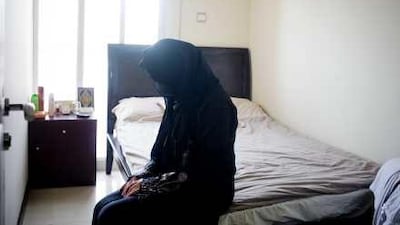ABU DHABI // After the success of the one-year-old Ewaa shelter in Abu Dhabi, organisers plan two new centres in Sharjah and the Northern Emirates for foreign women who have escaped forced prostitution. The first shelters for trafficked women in Sharjah and the Northern Emirates will open by the middle of this year, according to officials from the capital's refuge.
Sarah Shuhail, the executive director of the Ewaa Shelters for Women and Children, said two new facilities, in Sharjah and Ras al Khaimah, should be in operation in the next few months. "Each shelter will be able to look after around 20 women," Mrs Shuhail said. "We hope that more cases will come to light with the presence of these shelters." It is just over a year since Ewaa, "to shelter", opened its doors in Abu Dhabi for victims of human trafficking. Since then, it has provided temporary refuge for 56 women, nearly all of whom had been forced into prostitution. The majority have returned to their home countries.
Mrs Shuhail said over the past year she had borne witness to the brutality of the trade in human beings. One woman taken to the shelter had the name of her trafficker tattooed on her body. "It was like she was branded, like an animal," she said. There are 24 women currently staying at Ewaa's secure villa in the capital. It can accommodate up to 30. The centre takes trafficking victims from any emirate, but Mrs Shuhail said the long-term plan was always for a network of shelters.
"Until now we have been able to accommodate all of the cases that came up," she said. "But there are cases [that the women are involved with] in the Ras al Khaimah or Sharjah courts, so having shelters there will make things easier." Ewaa Abu Dhabi was launched in January 5, 2009, with Sheikh Mohammed bin Zayed, the Crown Prince of Abu Dhabi and Deputy Supreme Commander of the UAE Armed Forces, providing its annual budget, which falls under the UAE Red Crescent Authority.
The only other fully equipped shelter in the country is the Dubai Foundation for Women and Children, which opened in 2007. Ewaa plans to open a larger Abu Dhabi facility within two years. Mrs Shuhail said she and her team had developed a system to provide the women with support and care in the immediate aftermath of their rescue or escape. Ewaa staff knew "how to deal with the victims, who to deal with and who to talk to" in trafficking cases, said Maitha al Mazrui, Ewaa's co-ordination and follow-up officer. The women are usually transferred to the shelter by church groups, the courts, the police and embassies.
"We have noticed a lot more awareness and big changes in understanding about trafficking from the police and courts," Mrs Shuhail said. "We want to tell more people that everyone has the right to live in dignity. We want to say to traffickers, and the men who use these women, they should think about this happening to their daughters or sisters." When women arrive at the shelter they receive mandatory medical check-ups and tests, and counselling.
During their stay, women can choose to give information to the police or not. Most are aged between 20 and 30, and from a range of backgrounds: Arab, Asian, European and African. "The traffickers don't mind as long as they're women," said Ms al Mazrui. The shelter is planning to launch a publicity campaign and emergency helpline, which it hopes will lead to more victims being found. It is also working on an agreement with the Sharjah and Abu Dhabi police on a code to deal with trafficking victims. "We want these women to be treated humanely," Ms al Mazrui said. "We insist that police officers wear civilian clothes if they are inside the shelter. We ask them to transfer the girls [to Ewaa] if they think they are trafficking victims."
Sheikha Fatima bint Mubarak, the widow of Sheikh Zayed, the founder of the nation, was instrumental in the opening of the shelter. In November, she visited and met 15 women who were rescued from the capital's largest known trafficking ring. Afterwards, Sheikha Fatima donated Dh1 million (US$270,000), with an undisclosed sum earmarked for the women to help them rebuild their lives. Mrs Shuhail said she and her staff were arranging for the group to go home. "We will stay in contact and will be there if they need anything."
@Email:zconstantine@thenational.ae

